How to Prevent Hair Loss in Men & Women: Complete Breakdown
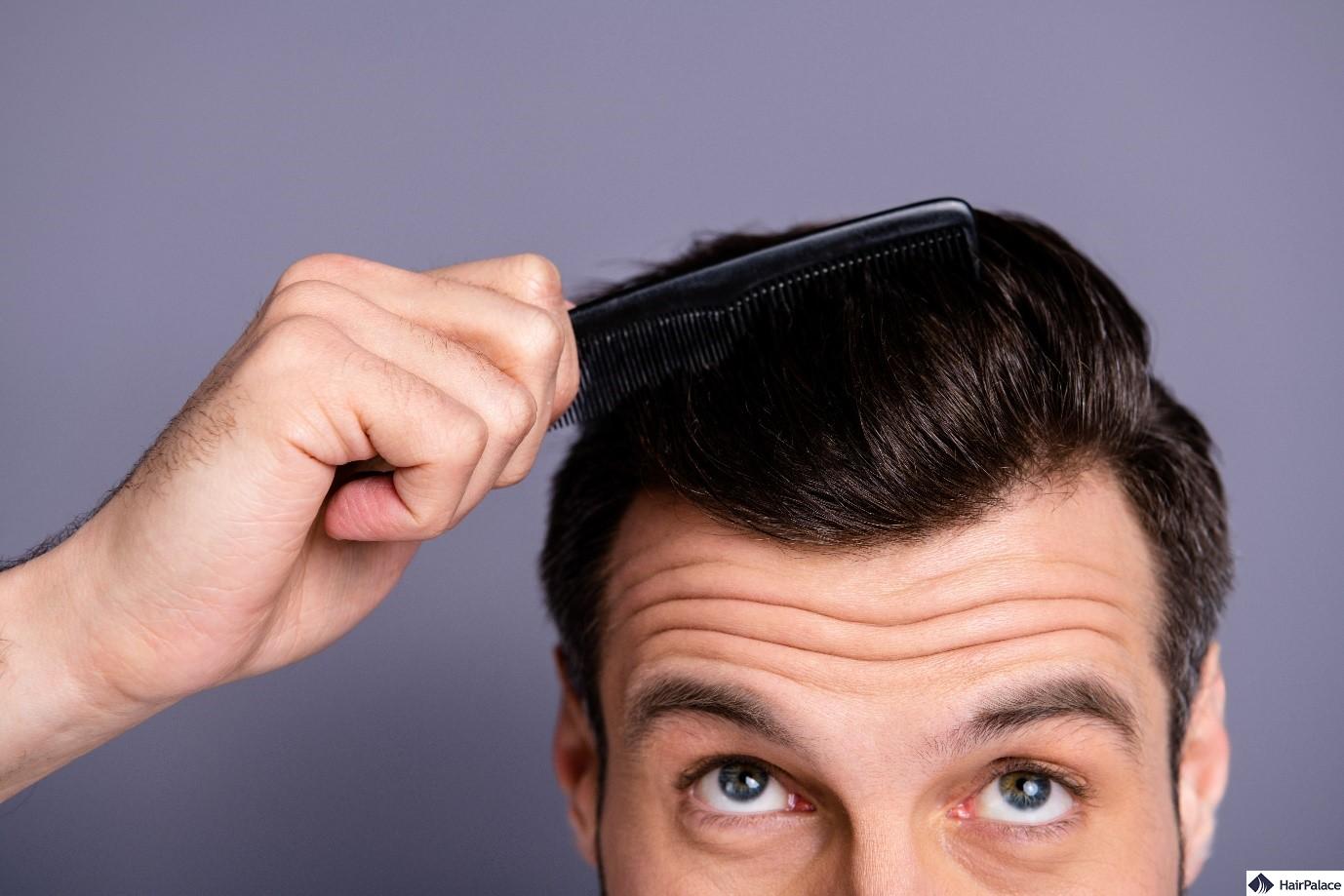
Preventing hair loss in men and women involves a complex approach that extends to your diet, stress management, and hair care routine.
Additionally, using medications such as minoxidil and finasteride, and considering hair loss treatments like low-level laser therapy, can support hair health and reduce hair loss.
Today, we’ll talk you through everything you need to know to prevent your hair from falling out.
We’ll explore the symptoms you may face, their causes, potential treatment options, and best practices.
With our help, you’ll find the answers to all the questions you may have.
Hair loss symptoms
Hair loss can affect people in different ways and at different severities.
Sometimes you may experience gradual thinning hair or a sudden and complete loss of hair.
The most common symptoms include:
1. Gradual thinning on the top
Gradual thinning of hair is arguably the most common symptom experienced by many hair loss sufferers.
For men, it starts with a receding hairline, eventually forming an ‘M’ shape at the forehead.
Women often experience a widening and gradual thinning around their hair part.
2. Circular or patchy hair loss
Some people can also experience circular or patchy hair loss.
This is called alopecia areata and can appear on both the scalp and facial regions and often starts with intense itchiness in the area.
Alopecia areata is caused by your immune system mistakenly attacking hair follicles.
3. Sudden hair loss or hair thinning
If you’ve suffered physical trauma or are experiencing severe stress, your hair may fall out in large quantities or become noticeably thin very quickly.
This hair loss is often temporary and will reverse when you’ve recovered.
4. Full-body hair loss
You may lose hair when undergoing certain treatments, like chemotherapy.
This type of hair loss is temporary and will often grow back once treatment stops.
5. A patch of scaling that spreads out over the scalp
If your type of hair loss forms a distinct pattern, like a ring, this indicates you are suffering from a parasite, like ringworm.
You may also experience hair breakage, redness, and swelling.
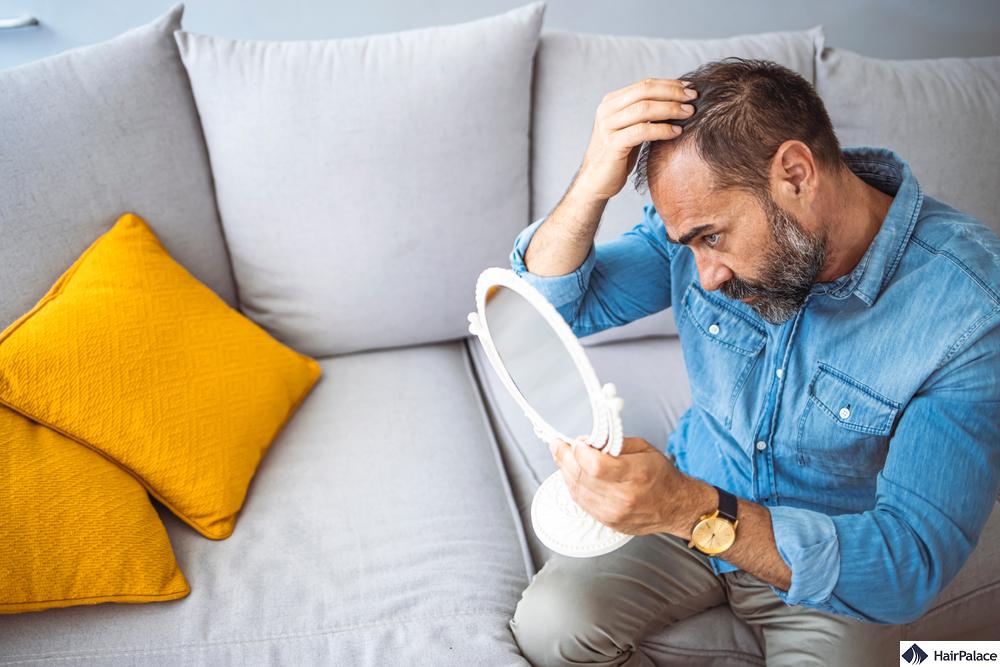
What causes hair loss?
Hair loss can be caused by several factors, including genetics, hormone levels, medical conditions, and treatments.
The most common cause is, of course, genetic hair loss.
If you have a family member who suffered hair loss, this may indicate you’re likely to, too.
Hereditary hair loss affects up to 50% of men and women.
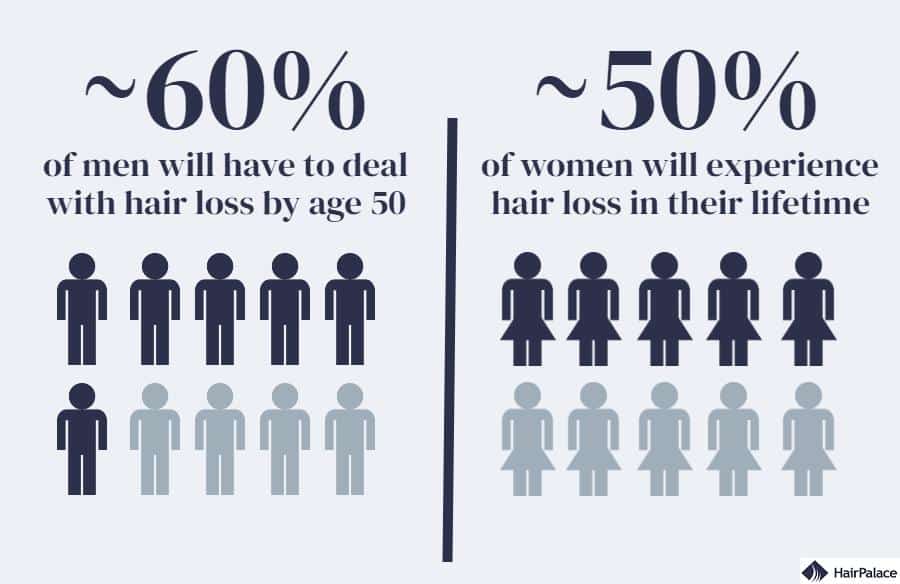
There are other causes of hair loss to be mindful of.
Some are temporary, while others are lifelong conditions. They include:
- Recent childbirth
- Undergoing chemotherapy
- Autoimmune conditions like alopecia areata
- Polycystic ovary syndrome
- Infection
- Nutrient deficiency
- Traction alopecia (repeatedly pulling hair out)
- Medication side effects
- Scalp psoriasis
- Scarring alopecia
- STIs like syphilis
- Thyroid disease
9 best ways to prevent hair loss
One of the best defenses against hair loss is ensuring you keep a healthy scalp and healthy hair.
Below are some easy ways to improve your health and help you retain as much of your hair as possible.
- Avoid hairstyles that pull on your hair
It may seem obvious, but how you style and carry your hair can significantly impact its texture and strength.
Avoid hairstyles like cornrows, ponytails, and tight braids as these can stress hair roots unnecessarily, pulling on the hair, weakening their root, leading to hair shedding, or even permanent hair loss.
- Avoid styling tools
Straighteners and curling irons can expose your hair to high temperatures and dehydrating follicles.
These tools cripple your hair and lead them to become brittle and vulnerable to breaking.
- Avoid harsh treatments
Similarly, avoid using adverse chemicals and bleaches on your hair.
These agents are known to target the keratin in your hair, which is responsible for a hair’s strength and glossy appearance.
- Only use mild shampoos
The purpose of a shampoo is to cleanse your hair of excess oil and dirt.
Washing your hair too often may cause potential harm.
Be especially careful about shampoos containing sulfates as they can cause scalp dryness and increase the fragility of your hair.
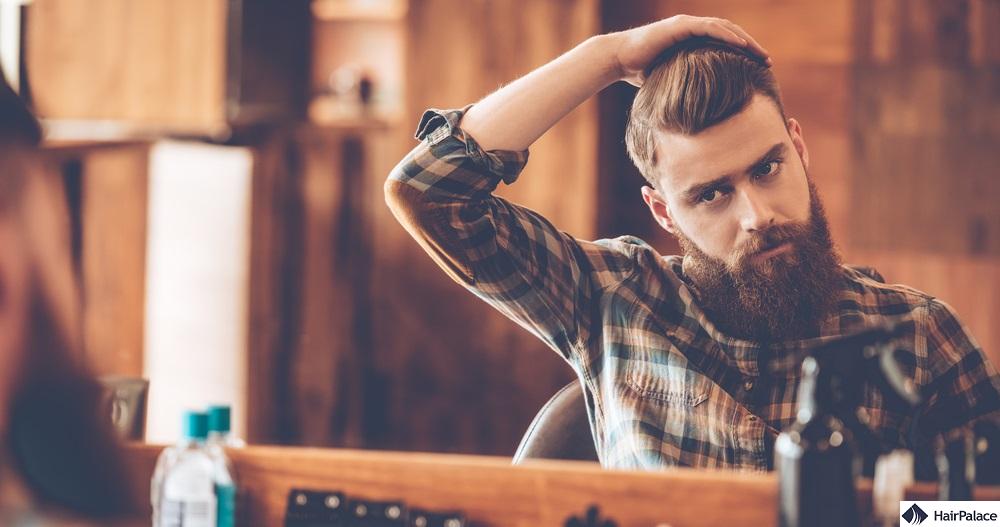
- Use a soft brush
Brushing your hair can help redistribute natural oils throughout your hair, as well as remove dirt and debris, and increases blood flow to the follicle.
Always use a soft brush with natural fibers, as these work best to nurture your hair.
- Low-level laser therapy
Low-level laser therapy is growing in popularity because it is a non-invasive way of stimulating hair growth.
It helps increase blood flow and decrease inflammation on your scalp and is particularly effective at supporting weaker follicles to grow stronger and for longer.
- Protein
Protein is the most crucial nutrient you should focus on implementing into your diet to aid hair growth.
Industry experts generally recommend between 40 to 60 grams of protein per day.
You can hit this target in various ways, including drinking protein and eating foods rich in protein, such as lean meats, fish, beans, and eggs.
If you are vegan or vegetarian, you should research supplements to increase your intake.
- Vitamins
Vitamins are an essential part of fueling our body. Some are responsible for combating illness, while others work on energy and blood flow.
Some vitamins, like A, B, C, D, E, zinc, and iron, are essential for promoting hair growth.
Always ensure you buy vitamin supplements from well-respected companies and brands.
Your doctor can advise you and conduct a variety of tests to see what vitamins you might require.
- Over-the-counter hair loss medication
Some medications can also help with prevention, all the while increasing hair growth.
The most popular is minoxidil, also known as rogaine. It can be bought without a prescription.
A growing number of studies are showing promising signs of its effectiveness.
Because it is available in solution and foam, it’s straightforward to incorporate into your weekly haircare regime.
How to prevent hair loss in men
Hair loss is much more common in men than in women. Experts estimate that up to 85% of men will experience hair loss by 50 years old.
Of course, the most common ailment is androgenic alopecia, also known as male pattern baldness.
Androgenic alopecia is caused by an increased level of the hormone DHT, which attacks hair follicles across your scalp.
There are four main treatments men can consider:
- Minoxidil
- Finasteride
- FUE hair transplant (FUE)
- Follicular unit transplantation (FUT)
Both minoxidil and finasteride are medications that can promote hair regrowth.
That said, neither offers a permanent solution to hair loss because the results will fade as soon as you stop treatment.
Only hair transplantation surgery can permanently correct hair loss.
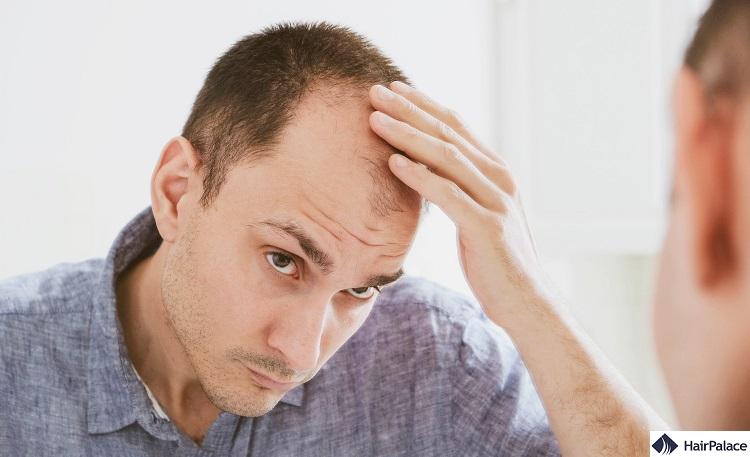
How to prevent hair loss in women
Although more common in men, women can also suffer from minor and extreme hair loss.
Statistics show that almost 50% of women will have experienced hair loss by age 79.
There are many causes of a woman losing her hair, including female pattern baldness, thyroid disease, hormone imbalance, and menopause.
As we grow older, the rate of hair growth slows.
Your doctor may recommend the following treatments:
- Minoxidil (Rogaine)
- Spironolactone (Aldactone)
- Oral contraceptives
- Iron supplements
Minoxidil is a popular medication that encourages new hair to grow.
Spironolactone slows down the production of androgens (male hormones) in the body.
This slows hair loss progression. Again, because minoxidil and spironolactone are medications, they are not permeant solutions.
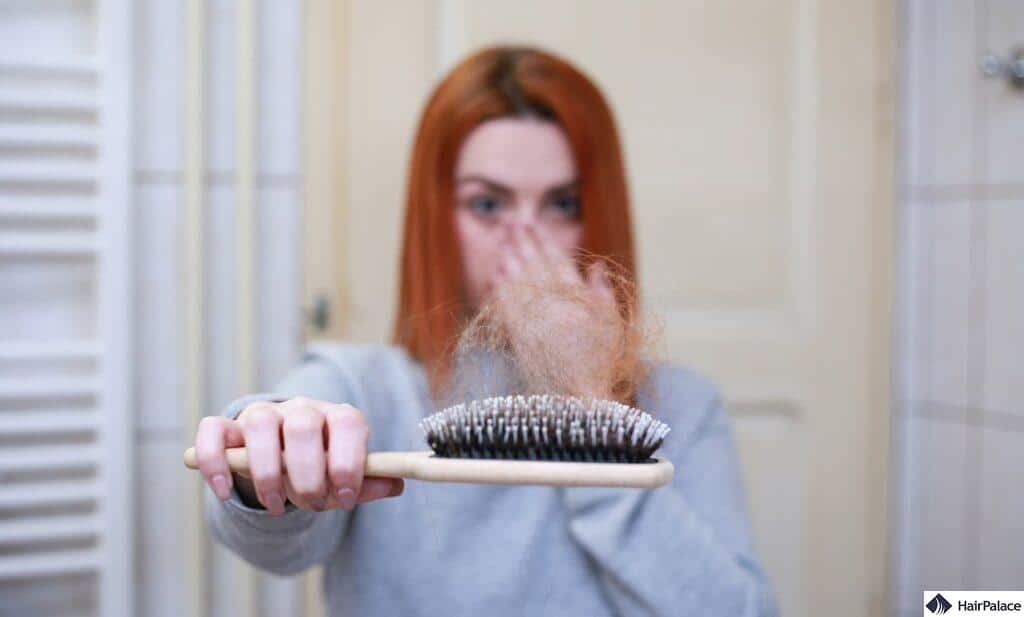
Tips to prevent hair loss after pregnancy
Pregnancy can take its toll on a woman’s body.
And many women experience everything from dehydration and fatigue to increased stress and hormone imbalance as their body readjusts to normality.
Some or all of these can contribute to hair loss or amplify the effects of female pattern hair loss.
Even temporary hair loss can have a distressing effect on us.
To minimize hair loss after pregnancy, you may consider taking prenatal vitamins if you’re breastfeeding.
You should also eat a healthy diet and avoid tight hairstyles that may pull on already delicate strands of hair.
Dermatologists recommend that you use lightweight conditioners and shampoo to avoid hair loss.
Preventing hair loss during chemo
Chemotherapy is an aggressive cancer treatment that attacks cancer cells in your body.
But a side effect is that it kills cells that make your hair follicles grow, and you can lose hair across your entire body.
Ultimately, your doctor can recommend various treatments for this hair loss.
One such one is scalp cooling treatment, which narrows blood vessels around your scalp and results in less chemotherapy reaching your hair. It costs on average between $1,500-$3,000.
Alternative ways to promote hair growth
If you suffer hair loss, it’s highly recommended that you visit your doctor for a diagnosis and find the root cause of your receding hair.
That said, there are some therapies you can incorporate easily into your everyday life to try and improve your situation. These include:
Supplements to stimulate hair follicles
As we’ve said already, vitamins and minerals are the building blocks our body needs to grow and remain strong.
They are essential for healthy-looking hair, and you should consider supplementing for anything you may be deficient in.
Vitamin D, for example, can alleviate symptoms of hereditary hair loss, alopecia areata, and telogen effluvium.
Iron and Vitamin C supplements work together to improve hair density in those suffering male and female pattern baldness.

Essential oils
Throughout history, plants have always had strong medicinal value to us.
Essential oils are extracts produced by certain plants and are thought to be able to alleviate a host of illnesses and boost our immune system.
A study carried out in 2016 found evidence that lavender might be the best hair oil to prevent hair loss and stimulate hair follicles.
However, the study was based on mice and not humans, so we can’t say for sure it will work for everyone.
Only with more time and research can we say if essential oils are essential to hair care.

If you’re curious about incorporating essential oils into your daily lifestyle, the following are some of the most popular:
- Peppermint
- Pumpkin seed oil
- Hibiscus
- Ginseng
- Jatamansi
- Lavender
- Rosemary
Scalp massage
Physical therapy like a scalp massage is also thought to influence hair growth and can potentially improve overall scalp health.
A 2016 study concluded that scalp massages resulted in an increased level of hair thickness after 24 weeks.
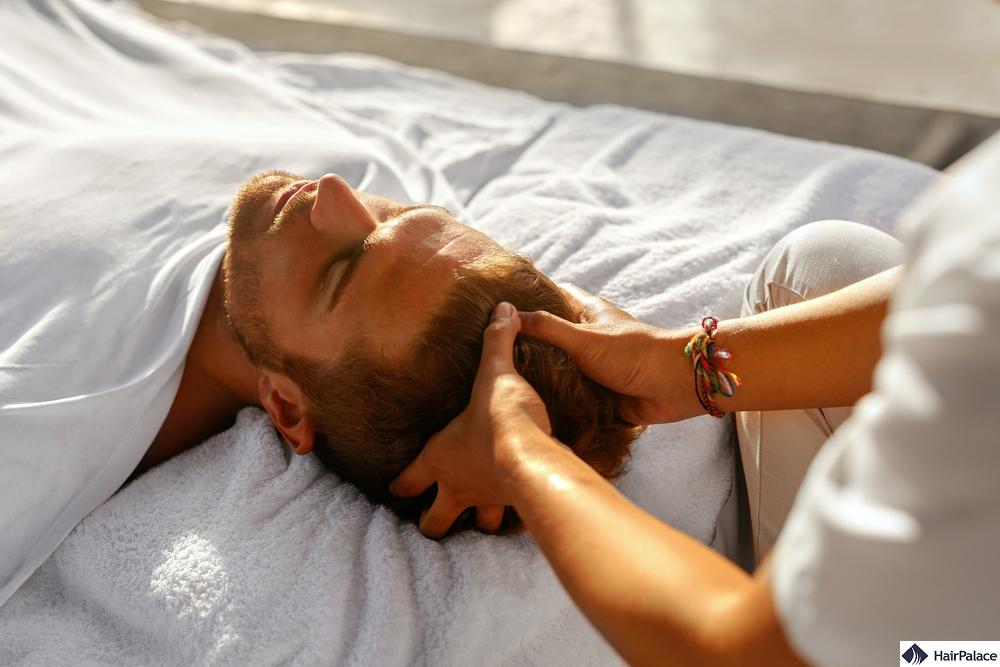
Diet
An unhealthy diet can hamper several parts of your body, especially your hair.
A balanced diet rich in proteins can create the perfect conditions to maintain strong, firm, and glossy hair.
Many people also try to incorporate antioxidants into their diet.
The top 5 foods to prevent hair loss include strawberries, blueberries, vegetables, beans and legumes.
Other foods include spinach and kale which are also full of antioxidants that help protect the cells in your body.

Quit smoking
It is no surprise that smoking causes harm to your body but, in particular, your scalp.
It damages hair cells and weakens them, leading to brittle strands that fall out earlier than expected.
Studies have shown smoking increases hair loss and also contributes to premature greying.
Conclusion
Several new treatments and therapies have made it possible to prevent and delay hair loss from taking complete control of your scalp.
True, some haircare treatments lack scientific research to prove their effectiveness.
As such, your best move forward to salvage your hair should be to visit your doctor.
Together, you can discuss an appropriate hair loss treatment worth your time and money.
FAQ
In the majority of cases, hair loss is preventable. But you need to take action as early as possible. You can develop a prevention plan to retain your hair by seeking professional advice from your doctor and a specialist. Several small changes to your day can also ensure hair grows stronger than before.
There is still so much we don’t fully understand yet about hair loss, and more research is needed to conclusively say the best preventative treatments. That said, many experts believe a healthy diet (rich in protein) is an incredibly important thing to maintain. Eat protein-rich foods like lean meats, fish, nuts, and dairy goods. For conditions like alopecia areata, medication may be the only viable solution.
Telogen effluvium is a form of hair thinning where follicles become brittle and shed quickly. It is a temporary hair loss that lasts 6 to 9 months. Stress is often the root cause of the problem, and once you recover, your hair will gradually return to normal. If your hair is thin because of male pattern baldness, you may need to consult a specialist to find the root causes of hair loss.
Regular exercise can benefit all parts of your body, especially your hair. Exercise helps boost circulation, allowing more oxygen and nutrients to travel around the body and reach your scalp.
Not entirely, but treatments may slow or reduce its progression and promote partial regrowth.
You can’t entirely prevent postpartum hair loss, as it’s a natural response to hormonal changes after childbirth. However, maintaining a balanced diet, avoiding stress, and gentle hair care can help minimize its impact and promote healthy regrowth.
Cold caps, also known as scalp cooling systems, may reduce hair loss during certain types of chemotherapy. While cold caps can be effective for some patients, they don’t produce results in all cases and may not work with all chemotherapy drugs.
There’s no concrete evidence to suggest that cold showers can prevent any loss of hair. However, cold water can help close hair cuticles and pores on the scalp, potentially making hair more resilient to damage and reducing the chance of dirt accumulation.
A loose braid or low ponytail can prevent hair tangles and breakage without putting too much tension on your hair. Always avoid tying your hair too tight, as consistent tension can lead to traction alopecia. Remember, the goal is to minimize tangles and friction while avoiding added stress on the hair follicles.
Last medically reviewed on July 24th, 2024
- Price, Vera H. "Treatment of hair loss." New England Journal of Medicine 341.13 (1999): 964-973.
- Shapiro, Jerry, Marni Wiseman, and Harvey Lui. "Practical management of hair loss." Canadian Family Physician 46.7 (2000): 1469-1477.
- Rushton, D. Hugh. "Nutritional factors and hair loss." Clinical and experimental dermatology 27.5 (2002): 396-404.
- Williamson, Daniel, Marc Gonzalez, and Andrew Yule Finlay. "The effect of hair loss on quality of life." Journal of the European Academy of Dermatology and Venereology 15.2 (2001): 137-139.
- Harrison, Shannon, and Wilma Bergfeld. "Diffuse hair loss: its triggers and management." Cleveland Clinic journal of medicine 76.6 (2009): 361-367.


